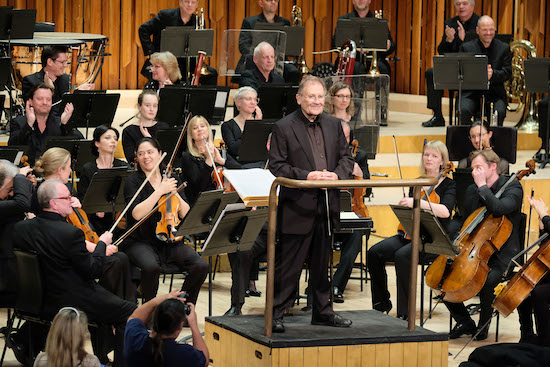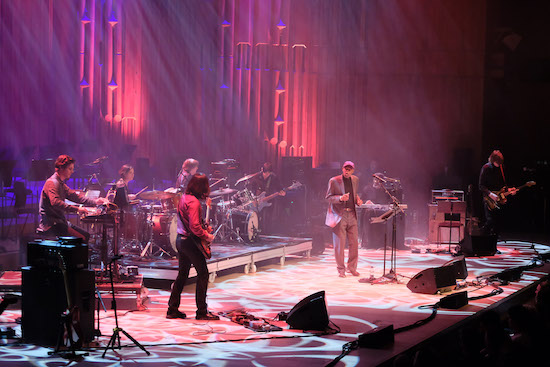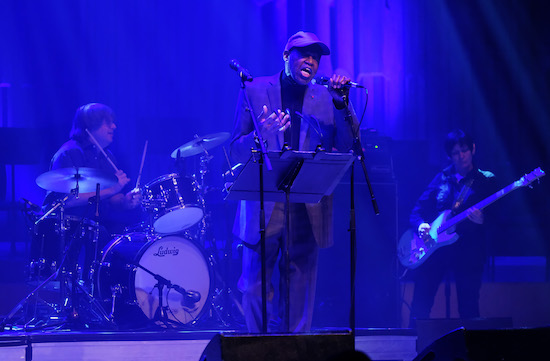All photos Mark Allan/Barbican
Can hold a special position in the hearts and minds of many music fans as true musical innovators whose bold and singular vision still resonates, undiminished across the passage of time, even 50 years after the group’s inception. True visionaries and creators of a new sound through the synthesis of the many forms that had gone before them, Can’s influence has insinuated itself into the very DNA of modern music. Far more than just the legions of krautrock copyists, Can’s distillation of garage rock, musique concréte, minimalism, voodoo drumming, Latin rhythms, funk and other still more mysterious ingredients has continued to inspire, without being ever being surpassed.
The expectations for a 50th anniversary concert are inevitably high. Marking the occasion is the premiere of a new orchestral piece, Can Dialog, by Irmin Schmidt, and a performance by original vocalist Malcolm Mooney backed by an all-star band playing Can songs. I’d had to sit on the news, casually delivered by Schmidt at the end of the Baker’s Dozen interview I did with him in December 2015 until the event was officially announced in November of the following year. The news that there would also be a band playing Can songs at the event was also an exciting prospect, but it was difficult not to wonder how such a thing might possibly work out, given that their live performance even back in its heyday was never about the faithful reproduction of studio tracks, and that even then they hadn’t played in that format for many decades. The nature of Can’s music, edited together collage style from many lengthy group sessions, yet sounding so seamless and organic was never easily realisable even when all the original band members were alive and present, so at this point, so long after the creation of that music, what could be expected?
The news of Jaki Liebezeit’s sudden unexpected passing in January 2017, as well as coming as a terrible shock to his friends and family, must have been a severe blow to the project. The decision to go ahead, both in memory of Jaki and also Michael Karoli, who passed away in November 2001, and with greetings expressed to Holger Czukay, who apparently is currently ill and unable to travel, seems entirely apt to the close to two thousand fans assembled to celebrate the band’s musical legacy.

For the first section of the evening, Irmin Schmidt conducts the London Symphony Orchestra in two pieces, the new Can Dialog, co-written with the composer Gregor Swellenbach, and Schmidt’s 2008 ballet suite La Fermosa. Schmidt clearly states his aim on the accompanying event programme: ‘When I founded Can I had the idea to bring Classical, Jazz, Rock – all the elements of the new music in the 20th Century – together. Now I want to try out if this idea, which was the fundamental idea about Can, would work for an orchestra.’ Weaving together classic quotes from Can’s discography, the first piece is an intense summation of avant garde classical music of a certain era that references a broad range of influences, from Bartok to Ligetti, Xenakis, Reich, Stravinsky and Charles Ives. There’s even an element of Bernard Herrmann to the psycho strings in one part and elsewhere some ominous, rumbling percussion reminiscent of the work of Harry Partch. The score conjures an odd sense of dislocation for the listener, its quotes far harder to grasp in this new context than the references to other composers. I struggle to identify a few and only manage to confirm the full list after the event:
Halleluwah
Vitamin C
Spoon
I Want More
Sing Swan Song
Father Cannot Yell
Yet for all the strangeness proffered by this new expression of Can themes, the music retains the strong rhythmic pulse inherent in all of the band’s music. The hypnotic lightness of Future Days pervades this piece, even during the low sustained thrum of strings and drums, like thunder perceived on the horizon, even through the jagged plucked strings of violins and harp and discordant horns. One section approaches the deliriously beautiful ebb and swell of Reich’s Desert Music and another the eerie ambience of Berlioz’s dreamlike Symphonie Fantastique. It is an undeniable treat to see Schmidt conducting the LSO, and this first section is a resounding success. The ballet suite that follows continues with a similar musical vocabulary, but seems less bold and striking than the new suite that preceded it. During the interval, Can’s famous 1972 performance at Cologne Sporthalle frustrates the crowd by playing at the edges of audibility. For the many present who know it well, it no doubt serves as a reminder of how idiosyncratic the band’s live performances were and further prompts the question as to how well the next section of the evening’s music might succeed in evoking its creators.
Put together by Thurston Moore and featuring Sonic Youth’s Steve Shelley, the Oscillation and Tomaga’s Valentina Magaletti and Tom Relleen, My Bloody Valentine’s Debbie Googe, James Sedwards and Pat Thomas, with Malcolm Mooney on vocals, it’s hard not to admire the octet’s audacity in even attempting to do this. An extended drone begins, Malcolm Mooney intoning illegibly at first, then finding his voice as the band segue into ‘Outside My Door.’ Another track from Monster Movie follows – ‘Father Cannot Yell.’ Then ‘Thief’ from the 1968 album Delay, and ‘Deadly Doris’ from The Lost Tapes. The choice of material, all early Malcolm Mooney songs with the exception of ‘Mother Sky,’ is wonderful and Mooney is in great form, emitting a wiry and unpredictable energy in a role he can’t have revisited for a very long time.

The band, however, as much as I hate to say it, for the most part aren’t capable of approaching the kind of unique intensity of the original music. There are moments, when the music stretches out a little that hint of that kind of greatness, of unpredictability of rhythmic structure. The two encores, ‘Yoo Doo Right’ and ‘Mary Mary Quite Contrary’ are the closest they come in this respect. Generally though, the drumming just doesn’t have the hypnotic lightness that Liebezeit managed so effortlessly. The guitars invoke a little bit more of the Stooges and Hawkwind than were ever present in Can and that pulsing quality, so evident in the orchestral section, just isn’t present at all during the group performance. Given that there are so many other bands out there who end up replicating the easier parts of the krautrock spectrum, without touching on any of the other more subtle elements that were always so essential to Can’s sound, it must be very difficult to do something like this and manage to escape such associations. Perhaps this performance is better than we had a right to expect, and for some people present it seems more than enough.
‘Yoo Doo Right’ is the closest we come to hearing Can in the spirit of the original. The regimented rhythm set mantra-like, the guitars more monochrome in their pyrotechnics than elsewhere in the set. I find myself questioning the doubling up of the instrumentation, given the often skeletal sound Can conjured from the single bass, drum, guitar and keyboard arrangement. Perhaps it was inevitable all along that a project such as this, with its musicians coming from predominantly such rock backgrounds would render Can’s music in far more conventional terms than was originally intended. It is also possible that the sound at the Barbican is not entirely favourable and that subsequent performances may see further improvements. Despite my misgivings, all sections of the evening considered, this was a worthy celebration of the 50th anniversary of one of the greatest avant garde rock groups of all time. A band whose influence will long continue to be felt in music for many more years to come.
A first authorised biography of Can – All Gates Open by Rob Young – is due in 2018. The Can Project play Glastonbury in June and will be joined onstage by Irmin Schmidt


